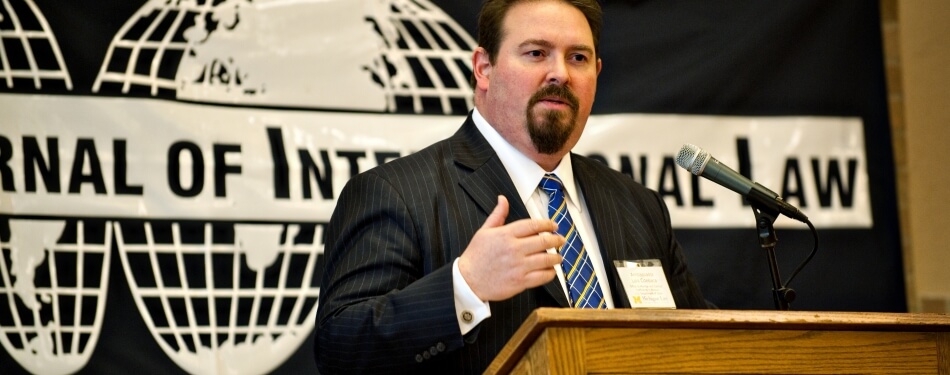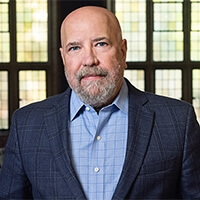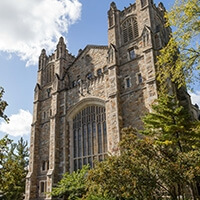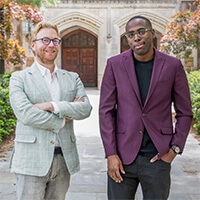Luis C.deBaca, ’93, a diplomat who served in the Obama Administration as Ambassador-at-Large to Monitor and Combat Trafficking in Persons and as Director of the U.S. Department of Justice’s Office of Sex Offender Sentencing, Monitoring, Apprehending, Registering, and Tracking (“SMART Office”), has returned to Ann Arbor to join the Law School’s faculty.
For the past two years, Ambassador C.deBaca has been a Lecturer at Yale Law School and the Yale School of Architecture, and Senior Fellow in Modern Slavery at Yale University’s Gilder Lehrman Center for the Study of Slavery, Resistance, and Abolition. He is also a 2017-2019 Soros Open Society Human Rights Fellow focusing on worker-led social responsibility.
This fall, building on his work confronting forced labor in architecture and construction, C.deBaca will teach the course, “Slavery, Its Legacies, and the Built Environment: Creating a Framework for the National Slavery Monument,” in the University’s Problem Solving Initiative. The course—a U-M/Yale partnership—will challenge multidisciplinary teams of U-M and Yale law and graduate students to create a framework for the proposed National Slavery Memorial in Washington, D.C.
“Lou has developed the global standard for combating human trafficking and is one of the most decorated federal prosecutors in the United States. He continues to find new ways to address modern day slavery in our society and I’m thrilled our students will have the opportunity to learn from him,” said Mark D. West, the David A. Breach Dean of Law and Nippon Life Professor of Law. “I’m very pleased to welcome Lou back to his alma mater as a member of the Michigan Law faculty.”
“Every time I come back to Ann Arbor—whether for a class reunion, a conference, or the Juan Tienda Banquet—I realize how much Michigan Law shaped me as a litigator and a policymaker,” said C.deBaca. “Michigan continues to be on the cutting edge of the anti-slavery fight, whether through the Human Trafficking Clinic, the Center for Social Solutions’ work on reparations and post-Emancipation slaveries, or the many alumni who are leaders in the movement around the world. It is exciting (and a little daunting) to come back on the other side of the classroom!”
Following his graduation from the Law School in 1993, C.deBaca joined the Criminal Section of the Civil Rights Division through the Attorney General’s Honors Program, where he investigated and prosecuted cases of police misconduct, hate crimes, and involuntary servitude/slavery. At the Civil Rights Division, he pioneered the “victim-centered approach” to trafficking/slavery cases, incorporating survivors and their advocates into the process and updating post-Civil War statutes for the modern era. He later served as Counsel to the U.S. House Committee on the Judiciary, where his portfolio for Chairman John Conyers, Jr. included national security, intelligence, immigration, civil rights, civil liberties, and modern slavery issues.
From 2009-2014, C.deBaca served as Ambassador-at-Large to Monitor and Combat Trafficking in Persons, appointed by President Obama. As the director of the State Department’s counter-trafficking office, he led U.S. government activities in the global fight against contemporary forms of slavery, leading the Cabinet-level President’s Interagency Task Force on Trafficking and the interagency Senior Policy Operating Group, resulting in the development of a U.S. Victim Services Strategy and an Executive Order to prevent exploitation in government contracting. He published annually the gold standard snapshot of global anti-trafficking efforts, the Trafficking in Persons Report, and conducted extensive bilateral and multilateral diplomacy, pressing for governments to apply the 3P paradigm of Prevention, Protection, and Prosecution as set forth in UN instruments and U.S. law. the. He subsequently led federal sex offender efforts, with a particular emphasis on tribal and juvenile issues, as head of the DOJ SMART Office. In 2017, he retired from the Department of Justice as one of the country’s most decorated federal prosecutors.
Ambassador C.deBaca has been active in the Hispanic National Bar Association, on police reform initiatives, and as a Member of the Council on Foreign Relations. A graduate of Iowa State University with an emphasis on rural communities, C.deBaca was an editor of the Michigan Law Review and chair of the Latino Law Students Association during his studies at the Law School.







